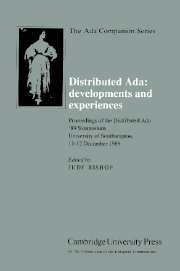 Distributed Ada: Developments and Experiences
Distributed Ada: Developments and Experiences Published online by Cambridge University Press: 13 October 2009
INTRODUCTION
Overview
This paper will present a study of practical design decisions relevant to the retargeting of a traditional compilation system to a distributed target environment. The knowledge was gathered during the course of Honeywell's Distributed Ada project which involved the retargeting of a full commercial Ada compilation system to a distributed environment. The goal of the project was to create a compilation system which would allow a single unmodified Ada program to be fragmented and executed in a distributed environment.
The Distributed Ada Project
The trend in embedded system architectures is shifting from uniprocessor systems to networks of multiple computers. Advances in software tools and methodologies have not kept pace with advances in using distributed system architectures. In current practice, the tools designed for developing software on uniprocessor systems are used even when the target hardware is distributed. Typically, the application developer factors the hardware configuration into software design very early in the development process and writes a separate program for each processor in the system. In this way, software design gets burdened with hardware information that is unrelated to the application functionality. The paradigm is also weak in that no compiler sees the entire application. Because of this, the semantics of remote operations are likely to be different from local operations and the type checking that the compiler provides is defeated for inter-processor operations.
To save this book to your Kindle, first ensure no-reply@cambridge.org is added to your Approved Personal Document E-mail List under your Personal Document Settings on the Manage Your Content and Devices page of your Amazon account. Then enter the ‘name’ part of your Kindle email address below. Find out more about saving to your Kindle.
Note you can select to save to either the @free.kindle.com or @kindle.com variations. ‘@free.kindle.com’ emails are free but can only be saved to your device when it is connected to wi-fi. ‘@kindle.com’ emails can be delivered even when you are not connected to wi-fi, but note that service fees apply.
Find out more about the Kindle Personal Document Service.
To save content items to your account, please confirm that you agree to abide by our usage policies. If this is the first time you use this feature, you will be asked to authorise Cambridge Core to connect with your account. Find out more about saving content to Dropbox.
To save content items to your account, please confirm that you agree to abide by our usage policies. If this is the first time you use this feature, you will be asked to authorise Cambridge Core to connect with your account. Find out more about saving content to Google Drive.